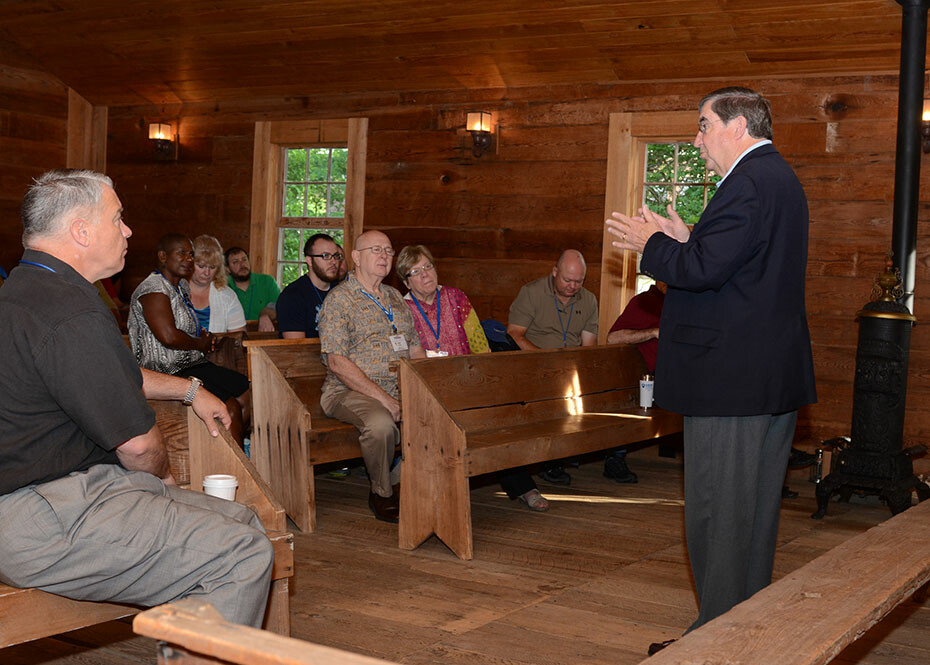Ministerial leaders meet at SWU

May 27, 2014 | Spiritual Life | Religion
Bob Black, right, SWU professor of religion, tells the story of Freedom's Hill Church and how its pastor, Adam Crooks, risked his life while taking an abolitionist stand in the pro-slavery South before the Civil War. SWU hosted FLAME (Fellowship of Leaders Acquiring Ministerial Education) on its Central campus May 19-23.
Southern Wesleyan University hosted FLAME (Fellowship of Leaders Acquiring Ministerial Education) on its Central campus May 19-23.
The participants at FLAME events are ministers in a preparatory track for either ordained ministers or those who are pursuing licensed, full-time ministry, according to Gary Carr, director of education and clergy development for The Wesleyan Church. They came to Central from all over the nation – some coming from as far away as Vancouver, Wash. and others from as close as Greenville.
The group of 30 represented ministry positions varying from pastors in the process of transfer, to associates in ministry staff positions, to those who have sensed a call to ministry later in life and are engaged in a plan of study and spiritual formation to validate and affirm that call.
One morning, FLAME participants met at Freedom’s Hill Church, where Bob Black, a professor of religion at Southern Wesleyan, told the story of the historic church and how its pastor, Adam Crooks, risked his life while taking an abolitionist stand in the pro-slavery South before the Civil War. Freedom’s Hill, a tangible monument to the abolitionist movement, was built in 1848 in the Snow Camp community of North Carolina, then moved to Southern Wesleyan’s Central campus in 2000.
“Worshipping and learning together at Freedoms Hill, the epicenter of Nineteenth-Century social reform for Methodists, FLAME students get firsthand experience to process today’s social challenges through the lens of being first in America as a denomination to care and serve those whom government agencies categorize as problems too divisive to resolve or manage,” Carr said.
Black pointed to bullet holes in one of the original wooden doors, now moved inside the church’s sanctuary, as he illustrated the persecution encountered by Crooks and his congregation. He told of how Crooks survived a lynching attempt and how a member of a lynch mob was heard to say that they needed to keep the rope so they could hang another Wesleyan. The denomination’s anti-slavery roots provided a framework for Black as he urged those in attendance to consider how the level of commitment demonstrated by Crooks, his congregation and other Nineteenth-Century church leaders is needed for ministers confronting contemporary issues, which include human trafficking, immigration reform and society’s moral decline.
According to Carr, course topics at Southern Wesleyan were Pastoral Ministry, Homiletics, Sociology, Psychology, Intercultural Studies, Church History, Christian Education and Church Leadership.
Southern Wesleyan University is a Christ-centered, student-focused learning community devoted to transforming lives by challenging students to be dedicated scholars and servant-leaders who impact the world for Christ. For details about degree programs, go online to swu.edu.